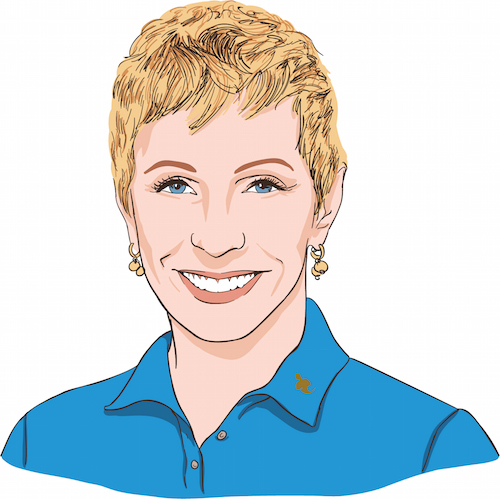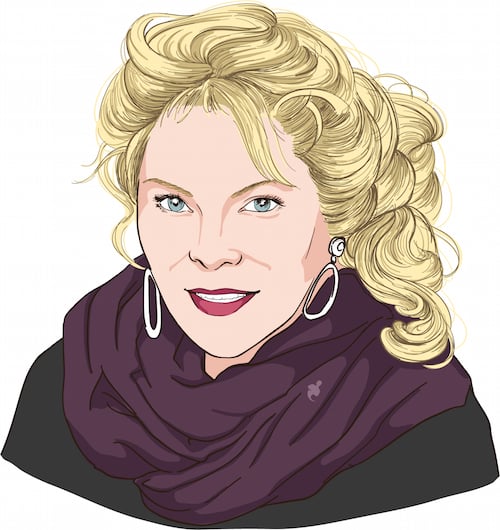One of the smartest ways to set your financial goals create a game plan to achieve them this is to learn from others who have (or have accomplished) similar goals. To help give you some ideas, we asked these self-made millionaires and Advisors in The Oracles to share their top money advice.
Invest in yourself

“My financial resolution is the same every year: to invest in myself. I blew all of my first commission on a fancy fur coat from Bergdorf Goodman. The minute I put on that coat, I knew it was the best $340 I’d ever spent.
Sure, I could have put the money into my growing business, but I knew I needed to invest in myself to get ahead. The coat made me feel like the queen of New York real estate, and everyone around me started to believe it.
Whether it’s a new coat to look the part, a massage to unwind, or just an afternoon off with a friend, you’ll never regret an investment in yourself.”
— Barbara Corcoran, founder of The Corcoran Group, podcast host of “Business Unusual” and investor on “Shark Tank”
StartupNation exclusive discounts and savings on Dell products and accessories: Learn more here
Put your money to work
“Don’t leave your money sitting in the bank to depreciate. Put it to work with investments that have the potential to appreciate and will give you consistent cash flow.
And I’m not talking about buying a home. (Contrary to popular belief, a house is not an investment, because it doesn’t pay you every month. I’ve made my fortune investing in real estate, but that doesn’t mean all real estate investments are a good idea).
Instead, make 2020 the year that you invest in yourself, like building skills that will make you better at your job.
— Grant Cardone, founder of Cardone Capital, a $750-million real estate empire. Follow him on Facebook, Instagram and YouTube
Give more
“The secret to living your fullest life is giving. While there is peace in having financial security and comfort, neither means anything unless you help others and have gratitude.
That’s why my financial goal is to give two times more. I’ve opened a separate bank account for giving, where a percentage of my income is automatically deposited each month so I can easily donate to causes I care about.
I also give through my company, Nunbelievable. We donate two meals to help fight hunger for every dozen cookies we sell. A rising number of consumers prefer brands that support a social mission, so giving is also good business.
We all have the power to touch others’ lives, extend gratitude and live more abundantly. Here’s to a new decade of giving more than we spend!”
— Kuda Biza, cofounder and CMO of Nunbelievable, cofounder of #ThisIsMyEra, and founder and board member of the Amani Hope Foundation. Follow him on LinkedIn
Only spend a percentage of your income
“Parkinson’s Law suggests that work expands to fill the time available for its completion. This also explains why we tend to spend what we earn — or more.
As a family, our 2020 financial resolution is to live on 20 percent of our income and set aside the rest for savings, charitable giving and investments. We’ve committed to mindfully keep our expenses consistent, even as our business and income grow.
That doesn’t mean we live in scarcity; we enjoy our lives while managing our resources. We use Mint to manage our personal accounts and QuickBooks to track our profit and loss, balance sheets, financial trends and budgets (with help from our accounting team). Then we regularly review these reports together for visibility, transparency and accountability.”
— Lin Sun, CEO at Tiny Devotions and partner at Crimcheck
Related: These 8 Business Moguls Reveal Their Secrets for Building an Unstoppable Brand
Be true to yourself (and the money will follow)
“My resolution is to connect my business goals with my personal values. This is more than a way of life — it’s the best way to build a successful business. While the quality of your product or service matters, even the best products don’t speak to people. People do. Consumers respond to authenticity and are increasingly good at detecting false promises and brand personalities.
When you’re true to yourself rather than trying to be likable, you win people’s respect — one of the most powerful assets a business can have. While you won’t be perfect and may lose an opportunity here and there, you’ll prove that your word is good, and credibility always translates to more dollars.
Own your personality, reflect it in your brand and encourage your team and clients to bring their real selves to the table.”
— Itzik Levy, cofounder and CEO of vCita, a comprehensive small business management platform; connect with Itzik on LinkedIn
Create a financial tracking system
“Put a system in place to accurately predict the next 12 months financially. It takes work to establish and maintain, but once you have a system in place, forecasting gets much easier.
First, determine how much income you’ll bring in throughout the next 12 months and create a budget for how you plan save or spend that money. Set up weekly or monthly checkpoint intervals, where you review your numbers to see how you’re tracking against your prediction.
Finally, bake into your budgets opportunities to pivot should the numbers perform as better or worse than expected — so you don’t reach year-end completely off the mark. It’s not rocket science; just commitment to process, procedure and accountability.”
— Dennis Najjar, cofounder of AccountingDepartment.com, a virtual accounting service for small businesses. Follow him on LinkedIn
Prepare for the four D’s
“To become financially bulletproof, be smart and prepare against the biggest threats to your financial future: debt, death, divorce and bad decisions.
You need money to retire; so plan accordingly and learn how to save for a rainy day. Set aside funds for future investments, business expansion opportunities and planned and unplanned situations. Make it a habit by using auto-deposit, so you don’t miss the money.
Always live below your means. The more successful you become, the more important it is to watch every penny. Once you aren’t as financially constrained, it’s easy to get caught up in the feeling of success and spend too much. Finally, watch out for hidden fees, including the ones from your financial advisors.”
— Gail Corder Fischer, cofounder and executive vice chairman of Fischer & Company, a leading global corporate real estate firm that provides consulting, brokerage and technology solutions
Sign Up: Receive the StartupNation newsletter!
Invest in real estate
“Find ways to get higher returns for your investments by networking or looking for the right deals. Even a few percentage points add up.
The difference between 10 percent and 15 percent returns might not seem like much in the short term, but over 30 years, that’s the difference between doubling your money four or seven times. Investing in real estate is a great way to do this.
To get higher returns on our investments, we network with developers who can deliver. We also leverage the size of our real estate brokerage, which had 700 closings in 2019, to create opportunities that we can offer people who want to invest with us and earn higher returns.”
— Daniel Lesniak, founder of Orange Line Living, broker at the Keri Shull Team, and cofounder of real estate coaching business HyperFast Agent; author of “The HyperLocal, HyperFast Real Estate Agent″
Originally published on CNBC.com. © 2020 CNBC LLC. All Rights Reserved. A Division of NBC Universal.













